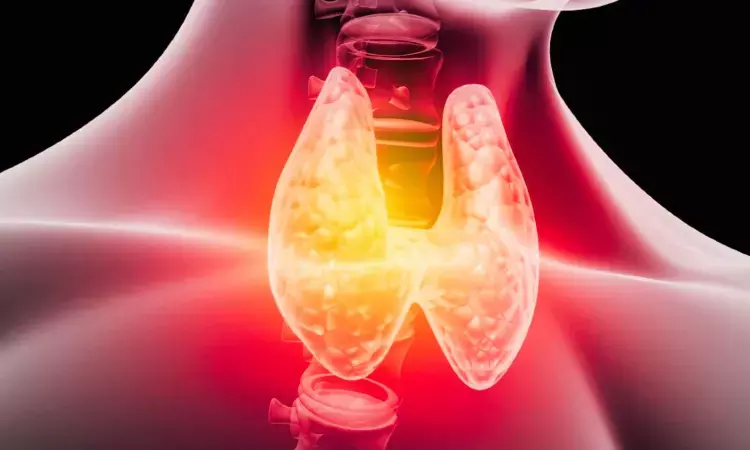- Home
- Medical news & Guidelines
- Anesthesiology
- Cardiology and CTVS
- Critical Care
- Dentistry
- Dermatology
- Diabetes and Endocrinology
- ENT
- Gastroenterology
- Medicine
- Nephrology
- Neurology
- Obstretics-Gynaecology
- Oncology
- Ophthalmology
- Orthopaedics
- Pediatrics-Neonatology
- Psychiatry
- Pulmonology
- Radiology
- Surgery
- Urology
- Laboratory Medicine
- Diet
- Nursing
- Paramedical
- Physiotherapy
- Health news
- Fact Check
- Bone Health Fact Check
- Brain Health Fact Check
- Cancer Related Fact Check
- Child Care Fact Check
- Dental and oral health fact check
- Diabetes and metabolic health fact check
- Diet and Nutrition Fact Check
- Eye and ENT Care Fact Check
- Fitness fact check
- Gut health fact check
- Heart health fact check
- Kidney health fact check
- Medical education fact check
- Men's health fact check
- Respiratory fact check
- Skin and hair care fact check
- Vaccine and Immunization fact check
- Women's health fact check
- AYUSH
- State News
- Andaman and Nicobar Islands
- Andhra Pradesh
- Arunachal Pradesh
- Assam
- Bihar
- Chandigarh
- Chattisgarh
- Dadra and Nagar Haveli
- Daman and Diu
- Delhi
- Goa
- Gujarat
- Haryana
- Himachal Pradesh
- Jammu & Kashmir
- Jharkhand
- Karnataka
- Kerala
- Ladakh
- Lakshadweep
- Madhya Pradesh
- Maharashtra
- Manipur
- Meghalaya
- Mizoram
- Nagaland
- Odisha
- Puducherry
- Punjab
- Rajasthan
- Sikkim
- Tamil Nadu
- Telangana
- Tripura
- Uttar Pradesh
- Uttrakhand
- West Bengal
- Medical Education
- Industry
Thyroid storm: Both beta-1 selective beta-blockers and propranolol fail to improve in-hospital mortality, study finds

Japan: In a breakthrough retrospective cohort study, researchers have shed new light on treating thyroid storm, a life-threatening condition associated with severe hyperthyroidism. The study, published in Critical Care Medicine compared the effectiveness of beta-1 selective beta-blockers against the widely used medication propranolol.
The researchers found that the choice between beta-1 selective beta-blockers and propranolol did not affect in-hospital mortality, regardless of acute heart failure in patients with thyroid storm. Therefore, the researchers suggest that beta-1 selective beta-blockers and propranolol can be regarded as viable treatment options for beta-blocker therapy in cases of thyroid storm, contingent upon the clinical context.
They however note that although there was no observed difference in acute heart failure patients, either beta-blocker should be administered with caution and tailored to the particular clinical scenario in this population.
A thyroid storm, characterized by an extreme elevation in thyroid hormone levels, poses a significant challenge in clinical management due to its potential for rapid deterioration and organ failure. Beta-blockers are a cornerstone of treatment for thyroid storms, primarily aimed at controlling the cardiovascular manifestations of the condition. Propranolol is the historically preferred option. However, 2016 guidelines issued by the Japan Endocrine Society and the Japan Thyroid Association recommend using beta-1 selective beta-blockers over nonselective beta-blockers, such as propranolol. Nevertheless, evidence supporting this recommendation is limited.
To fill this knowledge gap, the retrospective cohort study by Yuichiro Matsuo, University of Tokyo, Hongo, Bunkyo-ku, Tokyo, Japan, and colleagues aimed to investigate the in-hospital mortality of patients with thyroid storms based on the choice of beta-blockers.
The study used the diagnosis procedure combination database, a national inpatient database in Japan, and included patients hospitalized with thyroid storm between April 2010 and March 2022.
Propensity-score overlap weighting was performed to compare in-hospital mortality between patients who received beta-1 selective beta-blockers versus those who received propranolol. Subgroup analysis was also conducted, considering the absence or presence of acute heart failure.
Among the 2462 eligible patients, 1452 received beta-1 selective beta-blockers, and 1010 received propranolol.
Based on the study, the researchers reported the following findings:
- The crude in-hospital mortality rates were 9.3% for the beta-1 selective beta-blocker group and 6.2% for the propranolol group.
- After adjusting for baseline variables, the use of beta-1 selective beta-blockers was not associated with lower in-hospital mortality (6.3% vs. 7.4%; odds ratio, 0.85).
- No significant difference in in-hospital mortality was observed in patients with acute heart failure.
Further research is warranted to validate these findings and elucidate the underlying mechanisms behind the differential efficacy of beta-blockers in thyroid storms, including prospective randomized controlled trials.
"Nonetheless, the present study represents a critical step forward in optimizing the management of this life-threatening endocrine emergency, ultimately improving patient outcomes and reducing mortality rates," the researchers concluded.
Reference:
Matsuo, Yuichiro MD, MPH1; Jo, Taisuke MD, PhD2; Watanabe, Hideaki MD, MPH1; Matsui, Hiroki MPH1; Fushimi, Kiyohide MD, PhD3; Yasunaga, Hideo MD, PhD1. Clinical Efficacy of Beta-1 Selective Beta-Blockers Versus Propranolol in Patients With Thyroid Storm: A Retrospective Cohort Study. Critical Care Medicine ():10.1097/CCM.0000000000006285, March 29, 2024. | DOI: 10.1097/CCM.0000000000006285
Dr Kamal Kant Kohli-MBBS, DTCD- a chest specialist with more than 30 years of practice and a flair for writing clinical articles, Dr Kamal Kant Kohli joined Medical Dialogues as a Chief Editor of Medical News. Besides writing articles, as an editor, he proofreads and verifies all the medical content published on Medical Dialogues including those coming from journals, studies,medical conferences,guidelines etc. Email: drkohli@medicaldialogues.in. Contact no. 011-43720751


